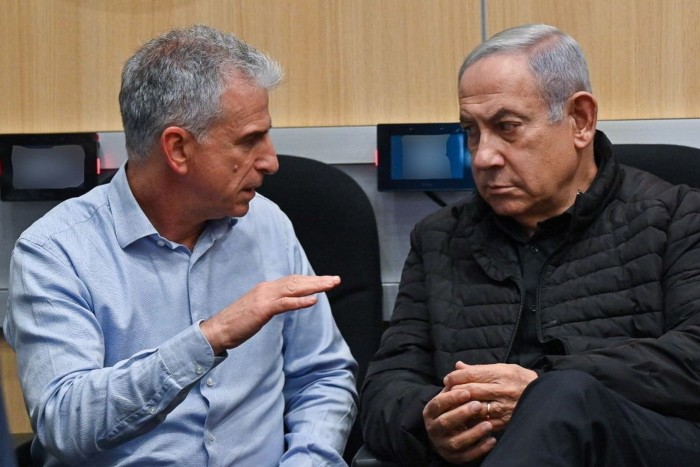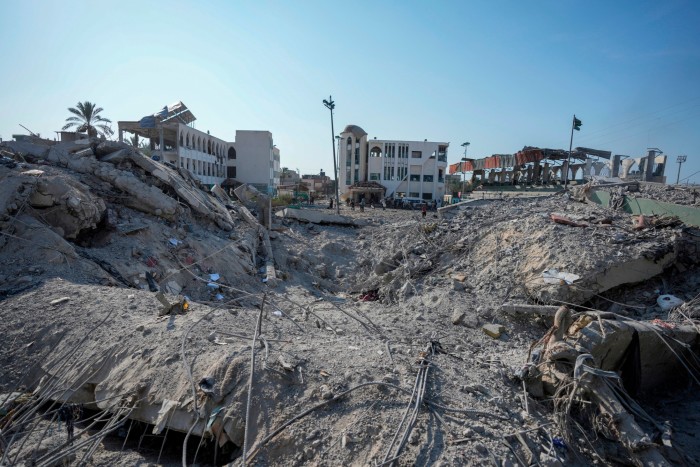
Israel’s spy chief held talks with his US counterpart on Sunday, as mediators made a fresh push to end the war in Gaza and secure the release of hostages after Israel hardened its conditions for a deal.
The talks between David Barnea, head of Mossad, CIA chief Bill Burns and Qatari prime minister Sheikh Mohammed bin Abdulrahman al-Thani in Rome come after Hamas this month softened its demands for an agreement, raising hopes of a potential breakthrough.
Securing a ceasefire-for-hostages deal between Israel and Hamas is also deemed critical for de-escalating regional hostilities triggered by the Gaza war. The extent of those hostilities was laid bare this weekend when a suspected Hizbollah rocket killed 12 civilians, mostly children, on a football pitch in the Israeli-occupied Golan Heights on Saturday.
While one person with knowledge of the negotiations said a deal for Gaza was “likely”, it was “not imminent”. “There are still significant gaps . . . and will require time to negotiate,” the person said.
A deal has so far proven elusive as Hamas originally insisted that any agreement must provide an upfront guarantee that the war would end permanently, something Netanyahu has refused to countenance. Hamas has now agreed to delay negotiations on how the war ends until the first phase of the three-stage process is complete.
The Israeli leader, meanwhile, has maintained that he will only consider a “partial” deal that temporarily halts the fighting, after which Israel would continue with its goal of “destroying” Hamas and achieving “total victory.”

Hamas’s decision to temper some of its initial demands spurred hopes of a breakthrough earlier this month. But Prime Minister Benjamin Netanyahu has introduced new conditions, people briefed on the talks said. Among Netanyahu’s new conditions was that Israel would not withdraw from the Gaza-Egypt border region, known as the Philadelphi corridor, which Israeli troops seized in May.
The mediators, a grouping that also includes Egyptian officials, are now seeking to convince Israel to soften its stance. They fear Hamas would reject the new demands — which include Israeli objections to allowing hundreds of thousands of Palestinians displaced to freely return to northern Gaza — and risk collapsing the talks.
The three-phase agreement would, if agreed, lead to an initial six-week truce during which Hamas would release women hostages, including Israeli soldiers, the elderly and the wounded held in Gaza.
This would be followed by what mediators hope would be an extended ceasefire, in effect ending the war, during which the remaining hostages, including male soldiers, would be freed. Israel would release Palestinian prisoners in exchange for the hostages, allow more aid into the strip and redeploy its troops in Gaza.
Increasing pressure from both the Israeli military, including strikes targeting its senior commanders, as well as its own constituency, have led Hamas to soften its demands, people briefed on the talks said.
In an effort to break the deadlock, the US and other mediators have sought to convince Hamas to accept the initial six-week pause and allow other details to be worked out later on in the process.
“Mediators have managed to get Hamas to agree on several of the outstanding issues. They’ve made concessions on some points that were part of their original demand for a deal, including delaying negotiations on how the war ends until the end of phase 1,” said a diplomat briefed on the talks. “The US and other mediators believed that this would be the last hurdle to reach a deal.”
Any optimism was dimmed when Netanyahu introduced his new demands, said several people with knowledge of the negotiations.
Along with the plans to continue to occupy the Philadelphi corridor, the Israeli prime minister also wants to negotiate the details of any redeployment of Israeli forces in the strip, despite it being previously agreed that this would take place after phase 1 of a deal.
As well as the Philadelphi corridor, Israeli forces also hold a second line, called the Netzarim corridor, that bisects the strip into north and south. Israel is believed to have agreed in previous rounds of talks to withdraw from Netzarim, although Netanyahu is now demanding that a monitoring “mechanism” be introduced to stop militants from returning to north Gaza.
Another outstanding issue relates to the Palestinian prisoners held in Israeli jails that are set to be released as part of a hostage swap.
According to the person with knowledge of the talks, the ratio of hostage-for-prisoners — as well as the “type” of Palestinian prisoner — has been agreed, as has a major Hamas concession that high-profile prisoners serving life sentences for murder be sent into exile, to an undefined third country.
However, they added, the scope of Israel’s veto power over certain Palestinian individuals, notorious in Israel for past militant attacks, was still unclear and required further negotiations.
About 115 Israelis and foreign nationals are still being held in Gaza after being seized during Hamas’s October 7 attack that sparked the war and Israel’s retaliatory offensive in the strip. Over a third have been officially confirmed by Israeli intelligence to have died.
Barnea was set to provide the mediators in Rome with Israel’s official response to the latest draft proposal.
“The mediators have been trying to convey that unless [Israel] softens its stance, there is a very real risk that negotiations would hit yet another stumbling block,” the diplomat said.

Complicating matters further is Netanyahu’s domestic politics.
The prime minister’s far-right political allies have come out strongly against any agreement, calling it “reckless” and a “surrender” to Hamas. Senior ultranationalist ministers including Bezalel Smotrich and Itamar Ben-Gvir have even threatened to bring down the government in protest and have rejected any halt to the fighting.
However, the Jewish ultra-Orthodox parties that form a core part of Netanyahu’s coalition have publicly backed a deal that would return home the hostages, as have the vast majority of Israel’s top security chiefs including Defence Minister Yoav Gallant.
“The conditions have been created and a limited window of opportunity has opened to establish a framework for the release of the hostages,” Gallant said last Sunday in a statement to Netanyahu ahead of the prime minister’s trip to Washington last week.
“The defence establishment backs you in your mission to bring about an agreement,” he added.
During meetings with Netanyahu last week, US President Joe Biden, Vice President Kamala Harris, and former president Donald Trump all called for the war to end as soon as possible and for the hostages to return home.
“It’s reaching a point that we believe a deal is closable and it’s time to move to close that agreement,” said a senior US administration official.